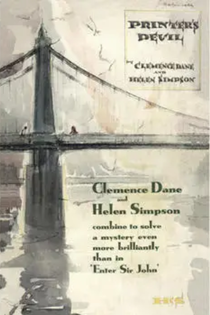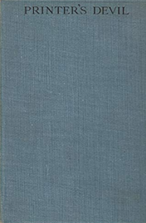
Such commingling of genres might not be a problem, but Printer’s Devil never quite manages to fuse the two approaches into a cohesive whole. This makes for a rather schizophrenic, if occasionally interesting, reading experience. The ambiguity isn’t helped by the way the character of Sir John Samaurez is used (or is underused) here. Samaurez, an actor and theatrical producer, assumed the central role of amateur sleuth in Dane and Simpson’s first effort, the previous year’s Enter Sir John, where he was kept busy saving an innocent actress accused of murder. In Devil, Sir John is present but treated like nearly all of the other supporting characters: he and they appear at social parties and are given just enough description and dialogue to fill the void, but scarcely more than that.
The mystery plot, when it finally activates later in the book, concerns the death of a powerful female publisher, Horatia “Horrie” Pedlar, who has the misfortune to fall from her fire escape one fateful night. Found among the ashes of the fireplace grate is the scrap of the cover page to Reflections, a manuscript by literary enfant terrible Marmion Poole that promises to reveal the embarrassing secrets of several prominent people.
It seems, then, that Horrie may have been killed to stop the memoir’s publication, and so far so good (and better late than never). But suspects prove elusive for the reader who wishes to play armchair detective, largely because the authors don’t seem interested in presenting a puzzle or a clear pool of supporting players. Rather, we are invited to spend our time with the budding young lovers, secretary Gilda Bedenham and publicist K.K. “Koko” Fry, two characters who are so indulgently, quirkily rendered that you know their creators would never implicate them in such a distasteful deed.

Martin Edwards, the prolific mystery author and crime fiction archivist, provides an illuminating review of this title on his blog (and has also acquired a dustjacketed edition of the book signed by Helen Simpson, the lucky devil). He suggests that ultimately the book is a failed experiment “because the authors strike the wrong balance between people and plot”, and I agree. Printer’s Devil was published in the U.S. by Cosmopolitan Book Corporation as Author Unknown. Thanks to the shared library network at Internet Archive, curious and intrepid readers in the U.S. can sample this semi-mystery’s text here.
 RSS Feed
RSS Feed